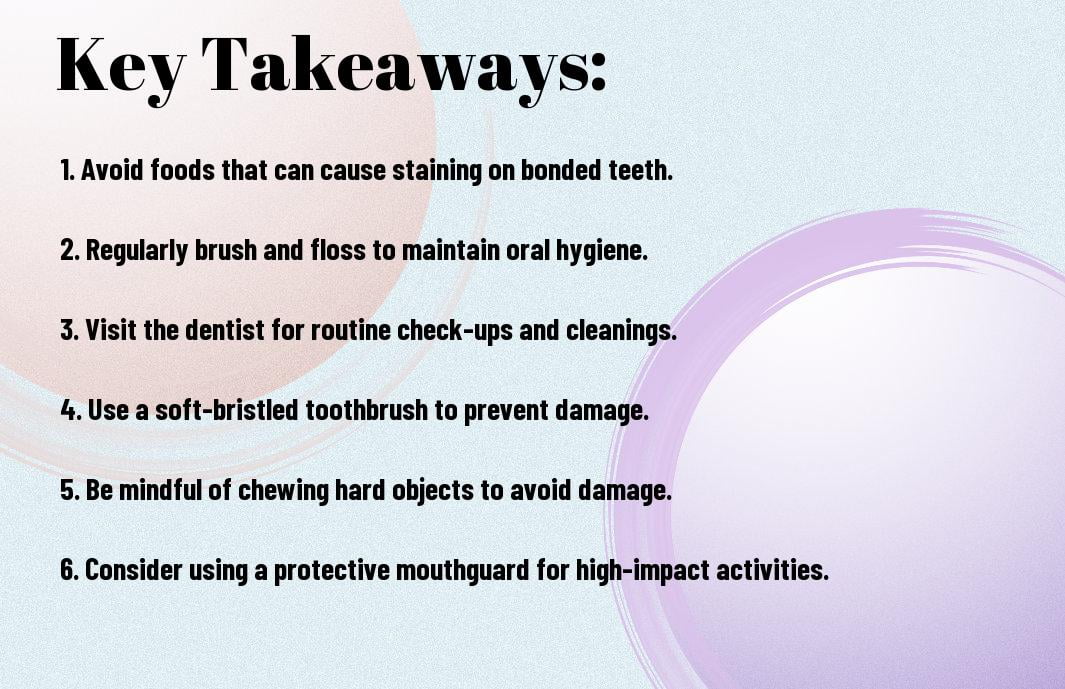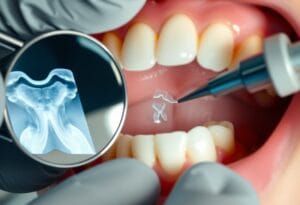Teeth that have undergone bonding procedures can be a significant investment in your smile, and it is crucial to properly care for them to maintain their longevity and aesthetic appeal. Bonding can enhance the appearance of chipped, stained, or misaligned teeth, but without proper maintenance, the results may not last as long as desired. By following some simple yet effective tips for caring for bonded teeth, you can ensure that your smile remains beautiful and healthy for years to come. In this blog post, we will discuss the best practices for protecting your bonded teeth and prolonging the results of the bonding procedure.
Key Takeaways:
- Regular dental visits: It is important to schedule regular dental check-ups to ensure the bonded teeth are in good condition and to address any issues early on.
- Proper oral hygiene: Maintain good oral hygiene by brushing and flossing regularly to prevent decay or damage to the bonded teeth.
- Avoid hard foods: Be mindful of what you eat to prevent potential damage to the bonded teeth, especially avoiding hard foods that can cause chipping or cracking.


Understanding Bonded Teeth
What is Dental Bonding?
To understand bonded teeth, it’s crucial to know that dental bonding is a cosmetic procedure where a tooth-colored resin material is applied and bonded to the enamel of your teeth using a special light. This procedure can address issues such as chipped, cracked, discolored, or gaps between teeth, providing a quick and cost-effective solution for smile enhancement.
Benefits and Longevity of Bonded Teeth
Any individual looking to repair minor imperfections in their smile could benefit from dental bonding. The longevity of bonded teeth varies depending on factors such as oral hygiene practices, diet, and habits like teeth grinding. Regular maintenance, including avoiding hard foods and beverages that can stain, can help prolong the results of your bonded teeth.
Another crucial benefit of bonded teeth is their ability to blend seamlessly with your natural teeth, providing an aesthetically pleasing result that boosts your confidence. However, it’s important to note that bonded teeth may not be as strong as natural teeth and can chip or stain over time if not properly cared for.
Daily Care for Bonded Teeth
Regular Oral Hygiene Practices
Some key aspects of daily care for bonded teeth include regular oral hygiene practices. The proper way to maintain your bonded teeth is to brush at least twice a day with a soft-bristled toothbrush and fluoride toothpaste. Flossing daily is also crucial to remove plaque buildup and food particles from between the bonded teeth.
The Role of Diet in Maintaining Bonded Teeth
The role of diet plays a significant part in maintaining the health of bonded teeth. Bonded teeth can be susceptible to staining and damage from certain foods and drinks. Acidic and sugary foods can wear down the bonding material over time, leading to weakening and discoloration. It is important to limit consumption of such foods and opt for a balanced diet rich in calcium and vitamins to support dental health.
Protecting Your Bonded Teeth
Avoiding Damaging Habits
For best results in caring for your bonded teeth, it is important to avoid damaging habits that can compromise the integrity of the bond. Teeth grinding, nail-biting, and using your teeth as tools can all place excessive stress on the bonded areas, leading to chipping or debonding. Be mindful of these habits and make a conscious effort to break them to preserve the longevity of your bonded teeth.
When to Use Protective Appliances
Damaging your bonded teeth can sometimes be unavoidable, especially if you lead an active lifestyle or participate in contact sports. In such cases, it is crucial to use protective appliances like mouthguards to shield your bonded teeth from potential trauma. Investing in a custom-fit mouthguard can provide an extra layer of protection, reducing the risk of damage and ensuring the longevity of your bonded restorations.
With the right precautions and awareness, you can protect your bonded teeth and prolong the results of your dental bonding treatment. By avoiding damaging habits and using protective appliances when necessary, you can maintain a healthy and beautiful smile for years to come.
Professional Maintenance of Bonded Teeth
Routine Dental Checkups and Cleanings
Bonded teeth require regular professional maintenance to ensure their longevity and appearance. Regular dental checkups and cleanings are vital for monitoring the condition of the bonded teeth and identifying any issues early on. During these appointments, your dentist will inspect the bonded teeth for any signs of wear, chipping, or discoloration. Professional cleanings help remove plaque and tartar buildup that can threaten the integrity of the bonding material.
Addressing Issues with Bonded Teeth Promptly
Bonded teeth may encounter problems over time, such as discoloration, chipping, or sensitivity. It is crucial to address these issues promptly to prevent further damage and maintain the cosmetic appearance of the bonded teeth. Any changes in the bonding material should be evaluated by a dental professional to determine the best course of action. Ignoring these issues can result in more extensive and costly repairs down the line.
Teeth that have undergone bonding procedures require diligent care and attention to ensure their longevity and optimal aesthetic appeal. Regular dental checkups, proactive measures to address any issues promptly, and proper oral hygiene practices are vital for the maintenance of bonded teeth. Bear in mind, early intervention can prevent more significant dental complications in the future.
Summing up
Upon reflecting on the tips for caring for bonded teeth to prolong results, it is clear that regular oral hygiene practices and preventive maintenance are crucial in maintaining the longevity and appearance of bonded teeth. By following proper care techniques, such as daily brushing and flossing, avoiding stain-inducing foods and drinks, scheduling routine dental check-ups, and using protective mouthguards, individuals can ensure their bonded teeth remain strong and aesthetically pleasing for years to come. Note, the key to prolonging the results of dental bonding lies in implementing consistent habits and seeking professional guidance when needed.
FAQ
Q: What are bonded teeth?
A: Bonded teeth are teeth that have undergone a cosmetic dental procedure where a tooth-colored resin material is applied and hardened with a special light, bonding the material to the tooth to improve its appearance.
Q: How can I prolong the results of caring for bonded teeth?
A: To prolong the results of caring for bonded teeth, it is crucial to follow good oral hygiene practices, such as brushing and flossing regularly, avoiding habits that can damage the bonding material, and scheduling routine dental check-ups for professional cleanings and maintenance.
Q: What habits should I avoid to prevent damage to bonded teeth?
A: To prevent damage to bonded teeth, avoid biting on hard objects, such as ice or pens, using your teeth as tools to open packages, chewing on hard foods like nuts or hard candies, and consuming staining substances like coffee, tea, and red wine excessively.





